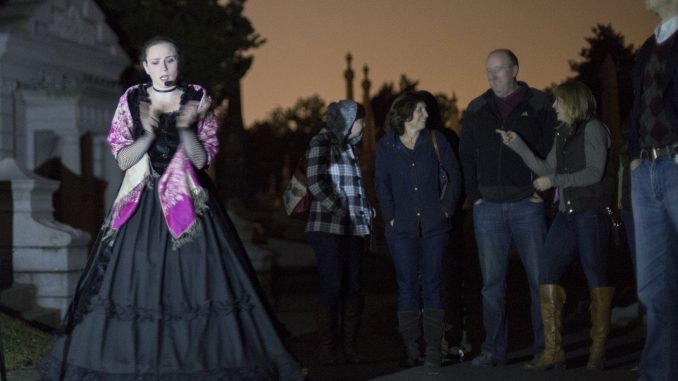

Groundskeepers at Laurel Hill Cemetery have found strange objects like melted candles and chicken bones throughout the historic graveyard in East Falls.
What appears to be remains of a ritualized ceremony could just be left by late night trespassers—or remains from someone or something unknown.
These happenings were the source of inspiration for playwright Loretta Vasile’s fascination with New Orleans history and Haitian Voodoo.
Vasile is the artistic director of the Mechanical Theater, a floating production in Philadelphia that develops performances with historical ties. She works closely with sites like Laurel Hill to craft her play’s storyline.
On Oct. 3-4, Vasile and co-director Adam Landon presented “The Gravedigger’s Daughter,” a suspenseful mystery with a comedic twist centered on the history of slavery and ancient practice of black magic.
The play connects the stories of Melancholy, a young Quaker Girl who works in her father’s graveyard, and a powerful, knowledgeable, freed slave and black magic practitioner named Sissy. Melancholy seeks advice from the woman and forms a close relationship with her.
Vasile incorporated cultural metaphors by using a child turned zombie, played by theater major Jessica Buno, who is later discovered to be Sissy’s daughter.
“I wanted to explore the notion of the zombie, which I think a lot of people don’t realize is actually a Haitian concept,” Vasile said. “The information in the play about the ‘zombie astral’—the idea of having a slave in a bottle essentially—are actually folklore beliefs associated with Haitian Voodoo.”
Vasile said people tend to forget, “The zombie, in many ways, is a cultural metaphor for slavery.”
Vasile cast strong, leading African -American protagonist roles because she believes these characters are uncommon in horror theater. For Sissy, Vasile wanted to create a significant character with an ambivalent age and mysterious history practicing Haitian voodoo.
“The actress who played Sissy commented that she thought perhaps she was a little too young to actually portray the character, because there’s a certain gravitas to her, there’s a sense that, here is someone who is innately powerful but she’s in a society where she is literally powerless,” Vasile said. Eliana Fabiyi, 23, received a call back from Vasile offering her the role of Sissy.
“Even though it was a comedy and everything, to portray a slave, you have to have a certain weight in such a terrible time in America’s history, so I wanted to do the character justice,” Fabiyi said. “So with that, I lowered the register of my voice and I even gave her a limp just to physicalize the pain and the life she’s seen.”
Fabiyi said her biggest challenge when taking on the role was perfecting the voice in the ambiguous dialect of her character.
“I tried to get the New Orleans accent as best as I could, but there isn’t a lot of surviving evidence of what slave’s accents from different parts of the United States would have been,” Fabiyi said.
After the end of each act, the audience was led by candlelight along a dark path to the location of the next act. Glimpses of the Schuylkill River and shadows of mausoleums created a convincing set of an ancient, historical graveyard.
In the middle of a scene change, similar to an intermission, candy, cookies and hot cider were provided while Laurel Hill tour guide Nancy W. Wright expanded on the play’s plot line and told similar stories about the graveyard’s history of slavery, abolitionists and the Underground Railroad.
On Oct. 23, 24, 30 and 31, Mechanical Theater will present “The Madness of Poe,” a theatrical piece based off notable works by Edgar Allan Poe, who lived in Philadelphia in the 1800s.
Alexa Zizzi can be reached at alexa.zizzi@temple.edu.



Be the first to comment